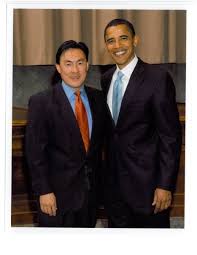 Can someone please explain to me what makes this ("Former Campaign Staffers Launch Their Own Bids") qualify as a news story? First, let me just start by saying that I support a couple of the former campaign staffers mentioned in the Post article (Terry McAuliffe for Governor, Mark Keam for Delegate, Mike Signer for LG) and am good friends with another (Adam Parkhomenko). I'm also happy to see ThinkProgress founder Judd Legum running for office. Barbara Comstock, on the other hand...no thanks.
Can someone please explain to me what makes this ("Former Campaign Staffers Launch Their Own Bids") qualify as a news story? First, let me just start by saying that I support a couple of the former campaign staffers mentioned in the Post article (Terry McAuliffe for Governor, Mark Keam for Delegate, Mike Signer for LG) and am good friends with another (Adam Parkhomenko). I'm also happy to see ThinkProgress founder Judd Legum running for office. Barbara Comstock, on the other hand...no thanks.The point is, I'm not questioning whether or not this is a news story because I have any problem with most of the people mentioned. In fact, I support most of them, with the exception of Comstock (ack!) and Parkhomenko (as much as I like Adam personally, I strongly support Miles Grant for Delegate). Instead, what I am questioning is why this quasi-fluff qualifies as a "news story" in a supposedly serious paper like the Washington Post (as opposed to local TeeVee news, which can't even remotely claim to be serious). I suppose the core argument to why this qualifies are the following paragraphs:
Political observers say that the dramatic 2008 election might be having a ripple effect and that it could catapult an entire generation into public service.OK, sure, that's possible. But how does an article about a few, selected (don't ask me how they were chosen, since there are many others), former political staffers running for office, something that's taken place since time immemorial, prove the thesis of a "ripple effect" that "could catapult an entire generation into public service?" And, more annoyingly, why focus specifically on political staffers, when there are so many other people in the grassroots and netroots, people like Miles Grant, who chose to throw their hats in the ring after working hard to elect Barack Obama president? How about all the other former political staffers running just in the 47th House of Delegates district alone?
"It may be that 20 years from now we look back and see that we have a class in the House of Delegates, the House of Representatives, the Senate who were energized by President Obama like we can now look back and say there were similar classes energized by John F. Kennedy or Ronald Reagan," said Quentin Kidd, a political science professor at Christopher Newport University in Virginia.
In short, is there any point here beyond having something to print on a lazy Memorial Day weekend? Or is this just another example of reporters writing about the people they know (there are lots of other candidates they could have focused on), the people who got in the news previously (for whatever reason), the people in the "establishment," or what? Personally, I tend to agree with a person who emailed, "[D]oes the [P]ost do any real reporting anymore? [W]hen not ripping off blogs, it seems they're just publishing press releases or oppo." No argument here.
P.S. I'm also confused as to whether the article is saying that the former political operatives running for office are: a) idealistic grassroots folks inspired by the Obama campaign of 2008; b) former Clinton campaign staffers done with their "soul searching;" or c) "Obama loyalists [who] have been angling for administration jobs" but haven't gotten them yet. It would be interesting to explore this topic more thoroughly; unfortunately, that something that this article doesn't do.

